In any sword and sandal fantasy film or television show, there is always a mention of the old gods, the elders, the ones people deified in what is invariably a dark period in whichever world you happen to be entrenched.
Robert Johnson is the old god, sitting astride the pantheon of American folklore, mythology, and Delta music.
Let's be clear, all American music is black music, and it finds its mystical powers from the voodoo swamps of the Americas. It's 35,000 square miles from southern Illinois to the Gulf of Mexico. 219 counties in seven states in northeastern Louisiana, western Mississippi, and southeastern Arkansas. Mile after mile of rich black alluvial soil stretched out long and slow before the eye.
This is the soil of American music. Gospel, jazz, R&B, country, and the blues. The Capital B blues. Grown in this soil.
Now this is not exactly privileged information, but this shit just ain't for everybody.
As Hank Williams is to country, as Charlie Parker is to jazz, Robert Johnson is to the blues. If the blues did indeed have a baby and they called it rock and roll, Robert Johnson is the great great granddaddy of it all. And if he is indeed our great great granddaddy, it's important to note that all families suffer and exalt in equal measure in their own canon and mythology.
Robert Johnson died in Greenwood, Mississippi in 1938. He was 27 and as such became the charter member of the famed 27 Club. Now as the legend goes, he sold his soul to the devil at the crossroads of old US highways 61 and 49 in Mississippi and thus launched the mythology. He was a relatively mediocre talent until that night.
After, he was the greatest blues guitar slinger in all the land if you believe in that sort of thing. Everything about the man swirls in a mystery of southern gospel and mystique, whiskey, and the looming specter of death. Robert precedes the proverbial Square One. He does not arrive fully formed from the miasma of American slave chants, sharecropper laments, and juke joint jams. Rather, he goes through a sort of Delta version of the Hero Arc.
But his beginnings? There's no redemption down there, little chance for escape, and certainly no packed arenas of fans chanting your name. But anyone who ever rose to fame with a guitar strapped to their body knows Robert Johnson's name. They speak it with the same reverence Catholics reserve for Saint Peter or Mother Mary.
Getting beyond the mythology takes some doing, but fortunately for us, Robert wasn't just some Faustian deal. The man could write, and the man could play. He could really fucking play.
Any guitar player, any guitar player, even the rookies, will tell you it takes extraordinary skill to play lead and rhythm at the same time. Robert did. On every song. The man sat in a room and played that way over 29 songs. 41 if you count alternate takes.
These 29 cuts of meat serve as the bedrock for the blues as we know it and consequently rock and roll. He was two players at once. Magic and Bird in the same person. He found a way to incorporate his driving rhythms in the lower strings with melodic figures on the higher strings.
His recordings were all intentionally sped up when first released, so a definitive analysis of his tunings and capo positions is nearly impossible.
He recorded only twice in his life. The first, San Antonio, November 23rd through the 25th, 1936, in room 414 of the Gunter Hotel. The second, in Dallas, in a makeshift studio at the Vitagraph, now Warner Brothers building, at 508 Park Avenue, on June 29th and 20th, 1937.
Come On In My Kitchen, Walking Blues, the magnificent Sweet Home Chicago, I Believe I'll Dust My Broom, the ethereal Ramblin' on My Mind, Hellhound on My Trail, and the Mount Rushmore demon of Crossroad Blues are all on these recordings and all are essential texts in the Blues and Rock canon.
But it takes a different lens to view this in the proper context.
As a traveling performer who played mostly on street corners, juke joints, and Saturday night dances, Johnson had little commercial success or public recognition in his lifetime. In fact, he was barely known for decades after his ‘38 death.
But the 29 songs Robert Johnson recorded in ‘36 and ‘37 became holy writ to guitarists from Keith Richards to Eric Clapton to Bobby Dylan to early Fleetwood Mac thanks to a 1961 release called King of the Delta Blues Singers.
The album rescued Robert from the dustbins of the dead and saved him from obscurity. The musicians who stumbled upon his record by chance or by fate were dazzled by the way he made a guitar sound like an ensemble - slide and rhythm parts yelping in dialogue, riffs emerging from the mist. Dylan remembers playing King of the Delta Blues Singers for a group of reporters.
“The vibrations from the loudspeaker made my hair stand up. The stabbing sounds could almost break a window.”
-Bob Dylan
The legend becomes the truth. It wasn't always this way. Robert was apparently a serviceable harmonica player, but an embarrassingly bad guitarist. That's according to Son House, himself a legend of the Delta.
About this time, 1930 or thereabouts, Robert packed up and left for Martinsville near his home of Hazlehurst. This is all Mississippi, of course.
I mean, where else?
He found a mentor in Isaiah Ike Zimmerman, who is also rumored to have discovered a supernatural playing technique by visiting graveyards in the wee small hours of the morning. Along the way, Robert played extensively with Willie Brown, Robert Lockwood Jr., and Honey Boy Edwards.
When Robert next appeared in cities and towns as a walking itinerant musician, he was said to have been possessed with extraordinary talent and skill. Son House attributed this ability to a deal with Mephistopheles.
You know, the Devil.
Robert died on August 16, 1938, of unknown causes.
His death was not reported publicly; he just disappeared from the record, and it was not until almost 30 years later when Gail Dean Wardlow, a Mississippi-based musicologist researching Johnson's life, found his death certificate, which listed only the date and location with no official cause of death. No formal autopsy was done,
He was a dead black man found by the side of the road near a farm in Mississippi in 1938.
However, 30 years of local legend and oral tradition had, like the rest of his life story, built a legend that has filled in gaps in the scant historical record. Several differing accounts have described the events preceding his death.
Johnson had apparently been playing for a few weeks at a country dance in a town about 15 miles from Greenwood. According to one theory, Johnson was murdered by the jealous husband of a woman with whom he had flirted.
Never heard that story before.
According to Sonny Boy Williamson, yet another Delta Blues legend, Johnson had been flirting with a married woman, and she gave him a bottle of whiskey poisoned by her husband. When Johnson took the bottle, Williamson knocked it out of his hand admonishing him to never drink from a bottle that he had not personally seen opened.
This is sound life advice.
Johnson allegedly replied, “Don't ever knock a bottle out of my hand.”
Soon after he was offered another bottle and accepted it.
This is unsound life advice.
Johnson is reported to have begun feeling ill the evening after and had to be helped back to his room in the early morning hours. Over the next three days, his condition steadily worsened. Some eyewitnesses said he was on all fours howling and barking like some hellhound. Witnesses reported that he died in a convulsive state of severe pain
The musicologist Mack McCormick claimed to have tracked down the man who murdered Johnson and to have obtained a confession from him in a personal interview, but he declined to reveal the man's name.
Of course he declined.
When the legend becomes fact, print the legend.
According to iconic film director Martin Scorsese, the thing about Robert Johnson was that he only existed on his records. He was pure legend. In keeping with his legend, Robert has three grave sites.
He's buried at Mount Zion Missionary Baptist Church near Morgan City. Columbia Records back in the ‘80s or ‘90s bought him an obelisk engraved with the names of all of his songs and put it near his grave.
There's a small marker in the Payne Chapel Cemetery near Quinto, Mississippi. The Atlanta-based rock group Tombstone, can't make that up, donated it.
And finally, on Money Road, north of Greenwood, underneath a big pecan tree in the Little Zion Church Cemetery. Sony Music placed a marker there.
You can believe what you choose to believe.
Maybe Robert just learned a thing or two with great tutelage. Maybe he sold his soul to the Devil himself, or the trickster god of African origin, Legba, himself associated with Crossroads. Or maybe, like the musicologist Alan Lomax, you dismiss all of this.
“In fact, every Blues fiddler, banjo picker, harp blower, piano strummer, and guitar framer was, in the opinion of both himself and his peers, a child of the Devil, a consequence of the black view of the European dance embrace as sinful in the extreme.”
-Alan Lomax
It turns out white European Christians still frown on the Blues and sex. Sadly for them, the Blues and fucking go hand in hand. The men don't know, but the little girls understand.
In 1990, Spin Magazine rated Robert first in its list of 35 guitar gods on the 52nd anniversary of his death. In 2003, Rolling Stone ranked him fifth on their list of the 100 Greatest Guitarists of All Time, and in 2010, Guitar.com ranked him ninth in its list of Top 50 Guitarists of All Time, 72 years after his death.
The Rock and Roll Hall of Fame has a list - the 500 songs that shaped rock and roll.
Sweet Home Chicago, Hellhound on My Trail, Love in Vain, and Crossroad Blues are all on that list.
And here we are, 112 years after his birth. Robert remains the emotional apex of a genre of music whose family tree is the largest in music. He gave us 29 songs of heartache, of night driving, of reflection, and of solitude, of early mornings and late, late nights. Robert remains the plaintive old god of American music.

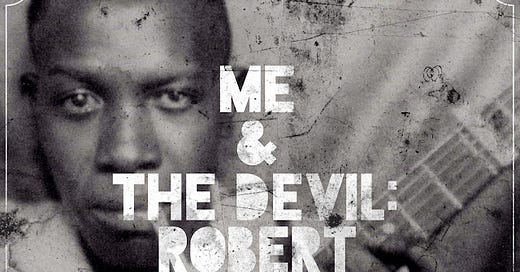
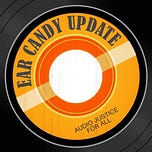



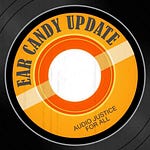
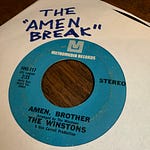
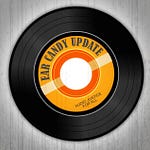


Share this post